1 - Expected post-Chinafy results
What is an ICP License? Do I Need It? and How Do I Get It?
Having spoken with hundreds of businesses, one of the most frequent questions we get is: "Do I need an ICP License?"
The short answer or TLDR; and to save you from reading the 2,000 words that follow, is likely 'No', but for those few people who -
i) work in very large companies, and/or
ii) have extremely large budgets, then read on, as you may still want, or need, one at the end of the day
An ICP License is one of those items that many people talk about, but might not be appropriate for every company.
For this reason, we wanted to offer some insight into what it is. Do you need it? And how do you get it? We'll also throw in the bonus question - is it worth it?
What is an ICP License?
An ICP (Internet Content Provider) certification is a permit issued at the province-level by the Chinese Ministry of Industry and Information Technology (MIIT) and coincidentally one of the most back-linked sites on the entire Internet.
The ICP permit allows you to host your website on a mainland Chinese server. All sites who wish to be hosted onshore is required to apply for and receive one before going live - a rule enforced by whoever hosts your domain name (e.g. your Service Provider or Content Delivery Network (CDN)).
ICP License numbers are typically displayed in small print on website footers with a single character to represent the Chinese province the license was issued in, then the letters "ICP" followed by the actual ICP number itself. The number can be displayed anywhere, technically, so long as it is clear and visible:
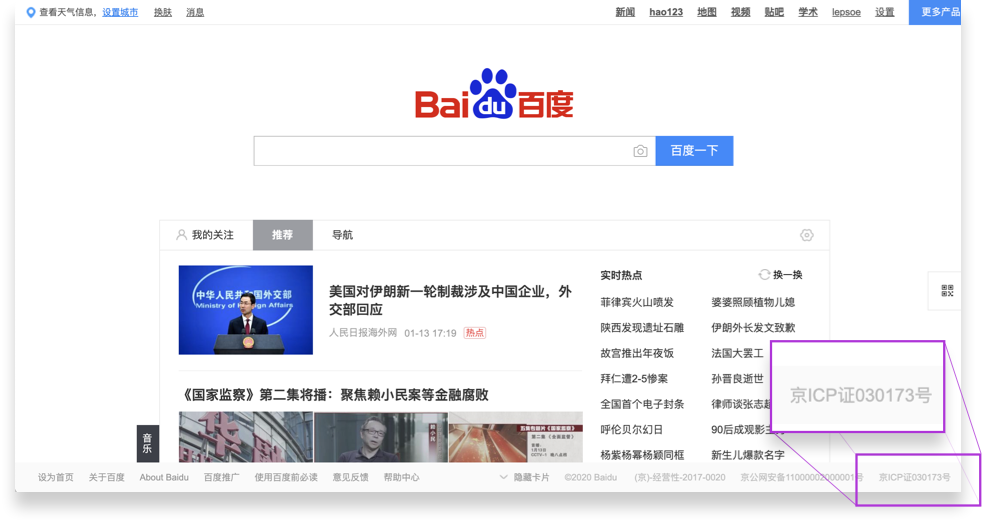
ICP license number example in footer (baidu.com)
While the above occurs in 99.99% of cases, there are times that companies provide links, or representation via other means. For example, this is an example on qq.com (owned by internet giant, Tencent)-
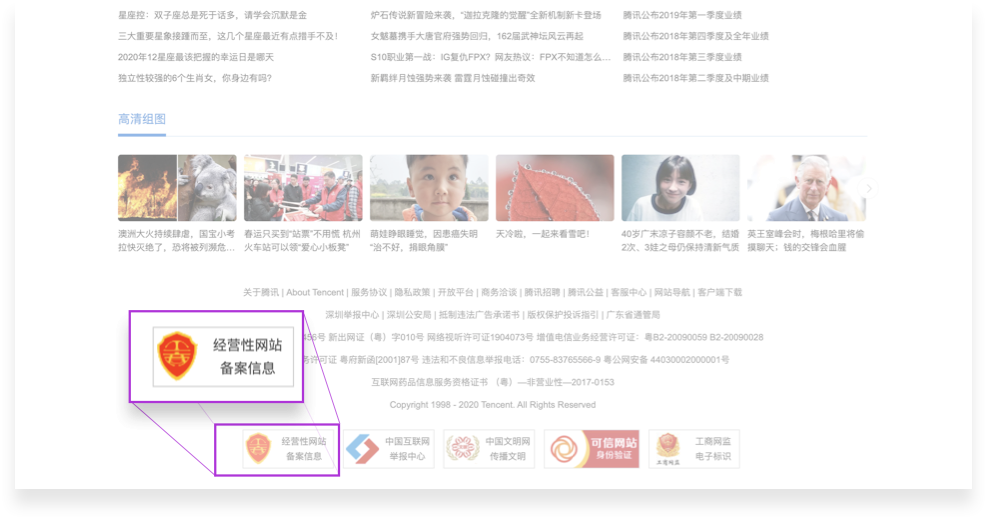
The problem with less conventional ICP formats, without an official link (like below) is that some links tend to get outdated.
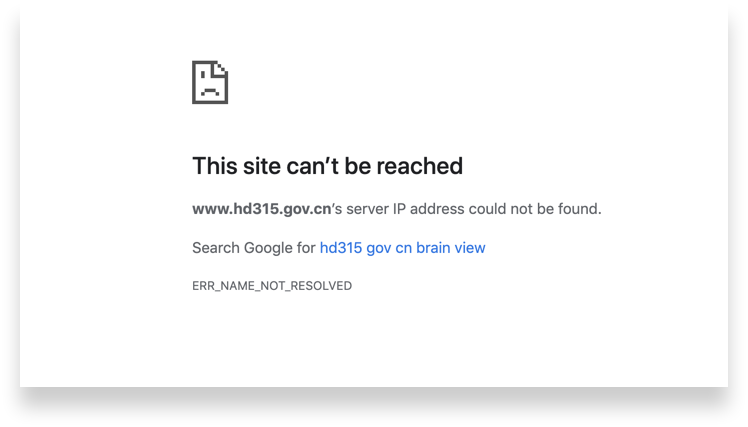
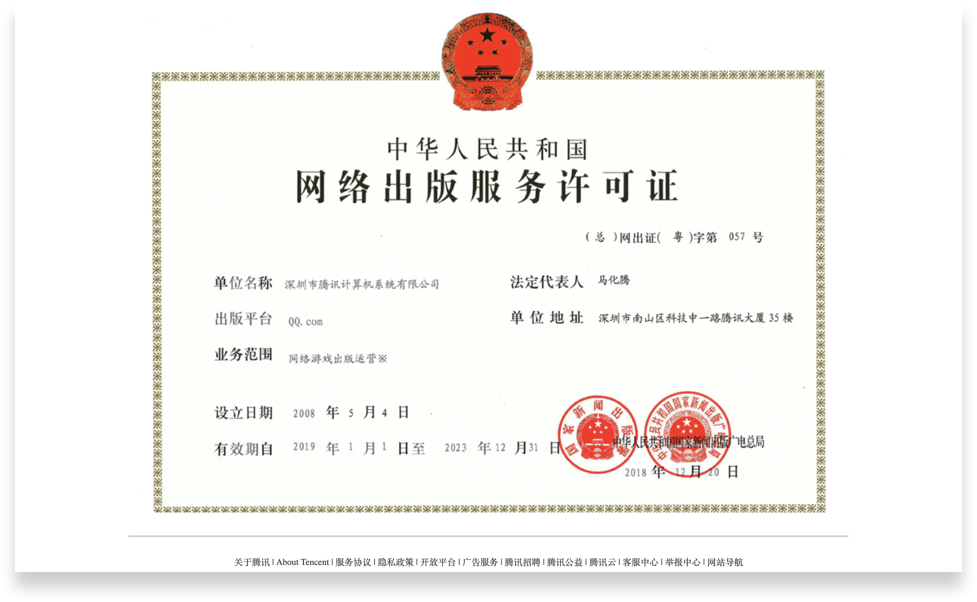
ICP license as a standalone link: https://www.qq.com/internet_licence.htm
Which Part of the Tech Stack is tied to the ICP?
The ICP license is attached to the domain. Where your ICP license applies is dependent on how your domain is managed.
There are three 'Service Providers' that most commonly come up with respect to whom the ICP could or should be registered with:
i) DNS Provider: The DNS or Domain Name System/Service/Server is the first touch-point for your domain. Your DNS provider typically performs two roles - 1) Registering, and 2) Hosting of your DNS. The DNS server tells internet browsers (i.e. people using Firefox, Safari, Chrome, etc...) that www.yourwebsite.com is available at IP address: 123.234.345.456. While you may host your DNS with a Chinese provider, you do not apply for the ICP through the DNS host, or registrar.
ii) Cloud Provider: If you're hosting in China - it's likely with a company like Alibaba Cloud, or Tencent Cloud. It is here that you'll need to apply and register for your ICP License. These providers tend to have services that can assist you with applications.
iii) CDN Provider: CDNs, like China Cache, CDNetworks or Quantil, typically sit on top of Cloud servers, and technically 'deliver' the websites to the end users. If you have a CDN, then your ICP registration actually sits with them as a final point of 'delivery'.
In practice, this means that if you're pointing your DNS to your CDN, then your ICP is with the CDN. If you're pointing your DNS to your Cloud Server, then your ICP should be with your Cloud Server.
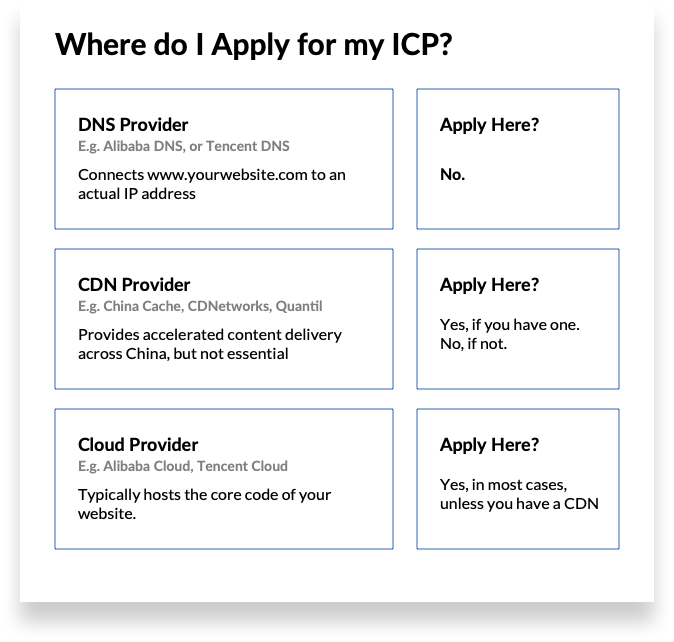
What are the different types of ICP Licenses and who can apply for them?
There are generally two types of ICP Licenses:
ICP Filing (ICP Bei An, 非经营性ICP/ICP备案)
Considered the 'basic', or first-step, of the two - the ICP Filing is for informational websites with no intention of sales.
ICP Commercial License (经营性ICP)
For more complex sites that require e-commerce functionality and online payment integration, you'll need to first acquire i) Your ICP Filing, followed by ii) Your Commercial ICP License.
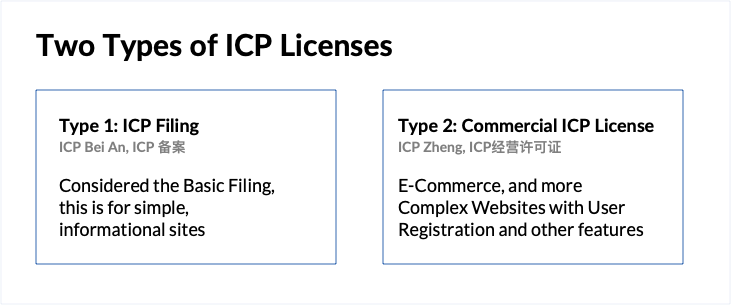
Chinese law stipulates that ICP Commercial License is needed for onshore sites with the following nature:
Advertising (网上广告)
Web building (代制作网页)
Ecommerce (电子商务)
Server rentals (出租服务器内存空间)
Hosting (主机托管)
Web application (其它网上应用服务)
Providing information for a fee (有偿提供特定信息内容)
There are various business requirements to apply for an ICP, e.g. business license in China.
We've summarised a list of most common requirements for an ICP here.
Why do you need an ICP?
While the idea of the Internet is for it to be virtually boundary-free, the Internet in China is so uniquely set up that it is arguably another world of its own.
Sites that are loaded perfectly in the U.S. can appear broken or even in some cases unable to load in China. That is because i) these sites are built with US library files/components, e.g. Google APIs, ii) there’s latency loaded from U.S. networks.
When a foreign site does loads in China, it can easily take upwards of 30 seconds, see samples from our data below.

(Source: Industry Data/Chinafy.com)
As site speed is synonymous with business performance, sites that are slow or broken are certainly detrimental to growth in China.
Some businesses leverage a solution like Chinafy - to optimise and deliver their site fast and fully in China, offshore.
Other businesses with a proven Chinese market or the resources to do so may opt to build and manage an independent, dedicated site in China. If they wish to host their site onshore, these companies will require an ICP license
How to apply for an ICP?
ICP Filing
Out of the two types of ICP, the basic ICP Filing is the relatively easier start. The application procedure is standard for both individuals and businesses.
You may either i) outsource the application entirely if you’re not proficient in Chinese or ii) DIY with verification from Service Provider (接入服务商)
See detailed steps outlined below:
i) Outsource to agency + Service Provider:
Buy a domain name and host it onshore with a local Service Provider.
Hire an ICP agency to manage all paperwork and file the ICP application. As all ICP applications and supporting documents can only be processed in Chinese, you’re recommended to work with an agency if you’re not proficient in Chinese. For reference, this is what a typical ICP agent will do for you:
Visit the Internal ICP Filing System offered by your Service Provider.
Fill out the required information about your site. This includes but is not limited to: your business name, number of China-registered business license, corresponding address and other contact information, etc.
Submit all necessary information and supporting documents to your local Communication Administrations (under MIIT) to file an official application.
Depending on your agency’s processing timeline, you may anticipate about 7-10 business days for all documentation to be complete.
ii) DIY (only recommended if you are proficient in Chinese):
Buy a domain name and host it onshore with a local Service Provider.
Complete a standard application form (网站备案信息真实性核验单*), you’ll only need to describe your business and the domain name of your site, leave the rest blank. *For reference only, please consult with your Service Provider for the most updated copy.
Request your Service Provider to verify and complete the form.
Visit the Internal ICP Filing System offered by your Service Provider to fill out more information about your site, which includes (but not limited to): your business name, number of China-registered business license, corresponding address, and other contact information, etc. Alibaba Cloud and Tencent Cloud offer their system in English - though bear in mind that all supporting documents will still need to be in Chinese.
Your Service Provider will then either a) submit it to MIIT on your behalf or b) duplicate your form alongside supporting documents and have you mail it to your local Communication Administration (CA). Click here for a complete list of contact details of local CA.
After your ICP application is officially filed, you will need to wait for about 20 business days for processing. You’ll receive an email or SMS notification about the result of your application. You may also see the updated ICP status real-time on MIIT.
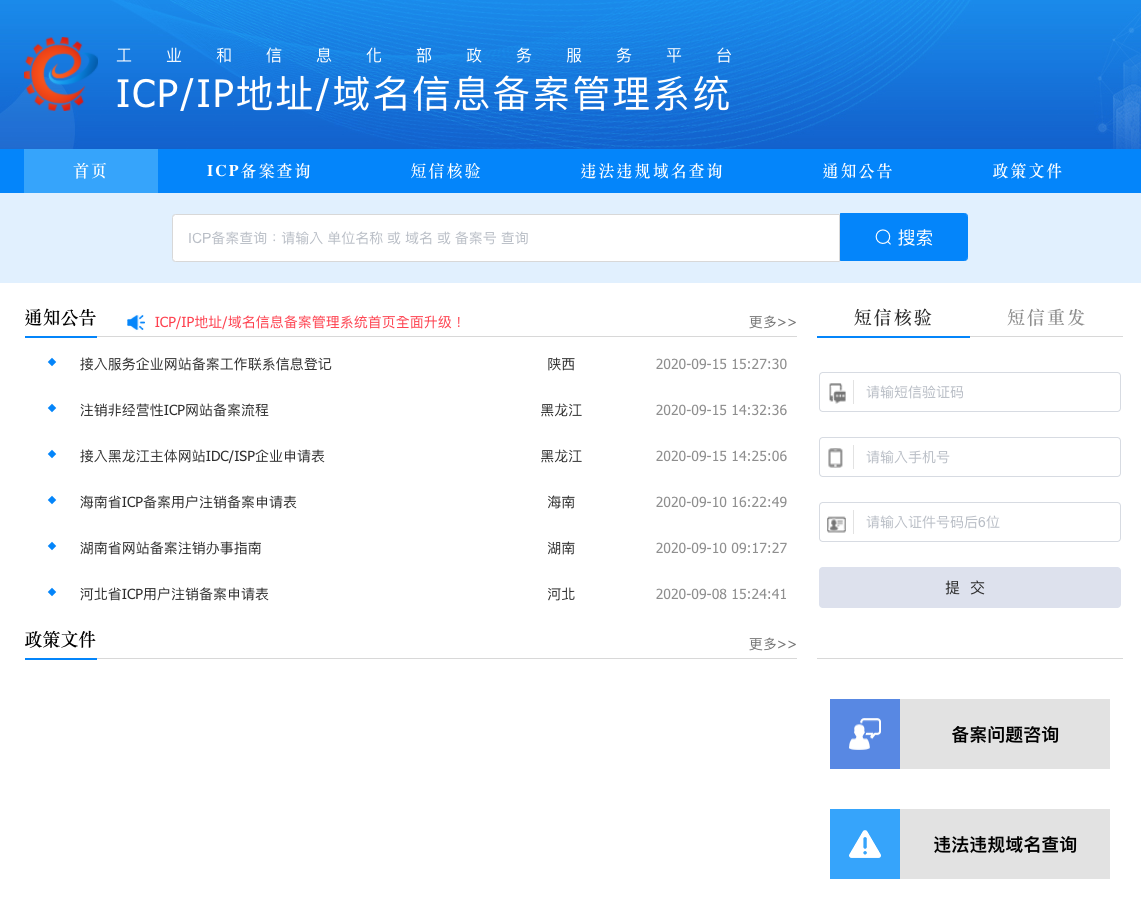
Enter your mobile number to see ICP application status via MIIT
ICP Commercial License
For companies looking to generate income from their site, they are required to apply for ICP Commercial License - and that is where things get much trickier.
You’re strongly advised to work with a consultant to increase the chance of your application getting approved. Business requirements for ICP Commercial License are more thorough, (e.g. your company finance and staff status will be reviewed, if not scrutinized).
To most foreign companies, another common barrier is that the application process and all documentation have to be entirely in Chinese.
In general, here’s what to expect in the process for an ICP Commercial License:
Notify your Service Provider to get started on ICP Commercial License via their Internal System.
Prepare supporting documents. Note that having your business license registered in China is a prerequisite.
Submit supporting documents verified Service Provider to local CA
Wait 4-8 weeks to see if your application is approved.
What's after the ICP application process?
ICP is not a set-up-once-and-leave-it process. As required by the Chinese laws, there're a few things you need to do (some regularly) after getting an ICP. More on this below.
1. Register on the National Internet Security Management Service Platform (全国互联网安全管理服务平台)
Firstly, within 30 days of receiving your ICP number, you’re required to register your site on the National Internet Security Management Service Platform (NISMSP). This process is similar to ICP Filing where you’ll be asked to verify your identity, describe your site and Service Provider, upload all supporting documents e.g. copy of your ID card and domain certificate.
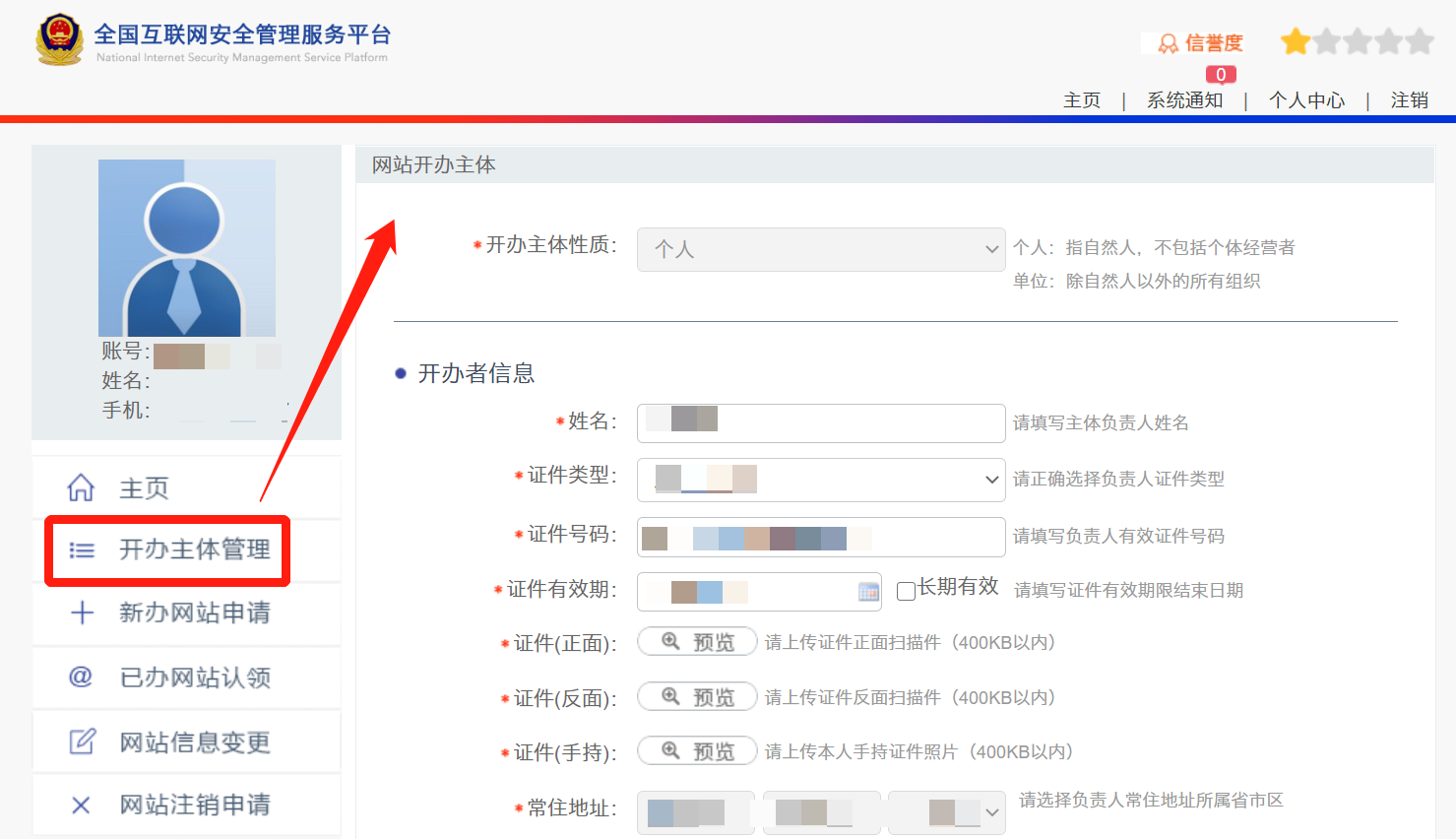
Register on the National Internet Security Management Service Platform to generate a license number. (Source: SXL)
If your site involves information-sharing, you might be requested to conduct an in-person interview with the officials at Internet Security, after which you will receive an SMS notification.
Either way, if your application is approved, you will receive a NISMSP number.
2. Display license number on your site
Next, you’ll need to do some modifications to display both ICP Filing and the new National Internet Security Management Service number on your site. Afterward, backlink them to MIIT and the Platform respectively.
For reference, see ICP number (in red) and NISMSP number (in green) on Bulgari.cn:
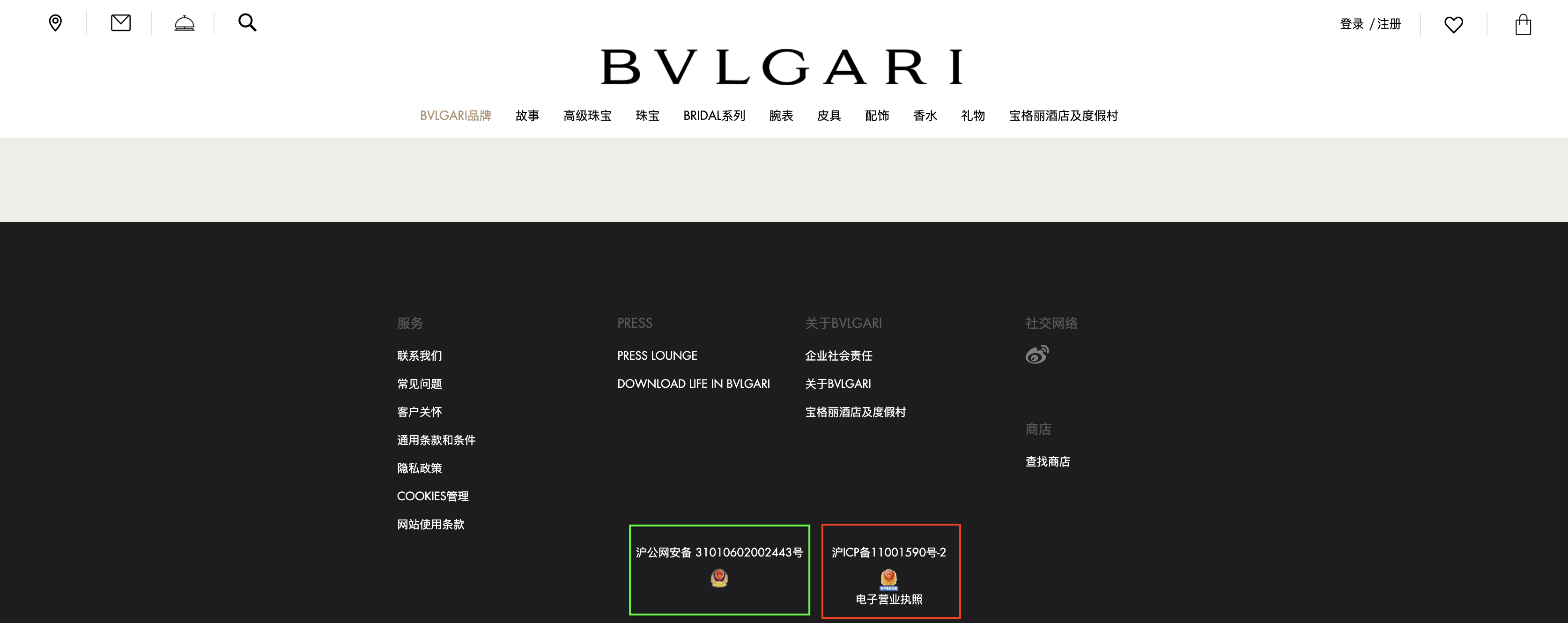
See ICP number (red) and NISMSP number (green) on Bulgari.cn
3. Keep up with maintenance and annual review
Your ICP Commercial License is only valid for 5 years and will need to re-apply once it has expired. Your site will also undergo an annual review every January to March, so it is important to have a local named contact on standby.
To sum up, this is the full process of getting an ICP in China:
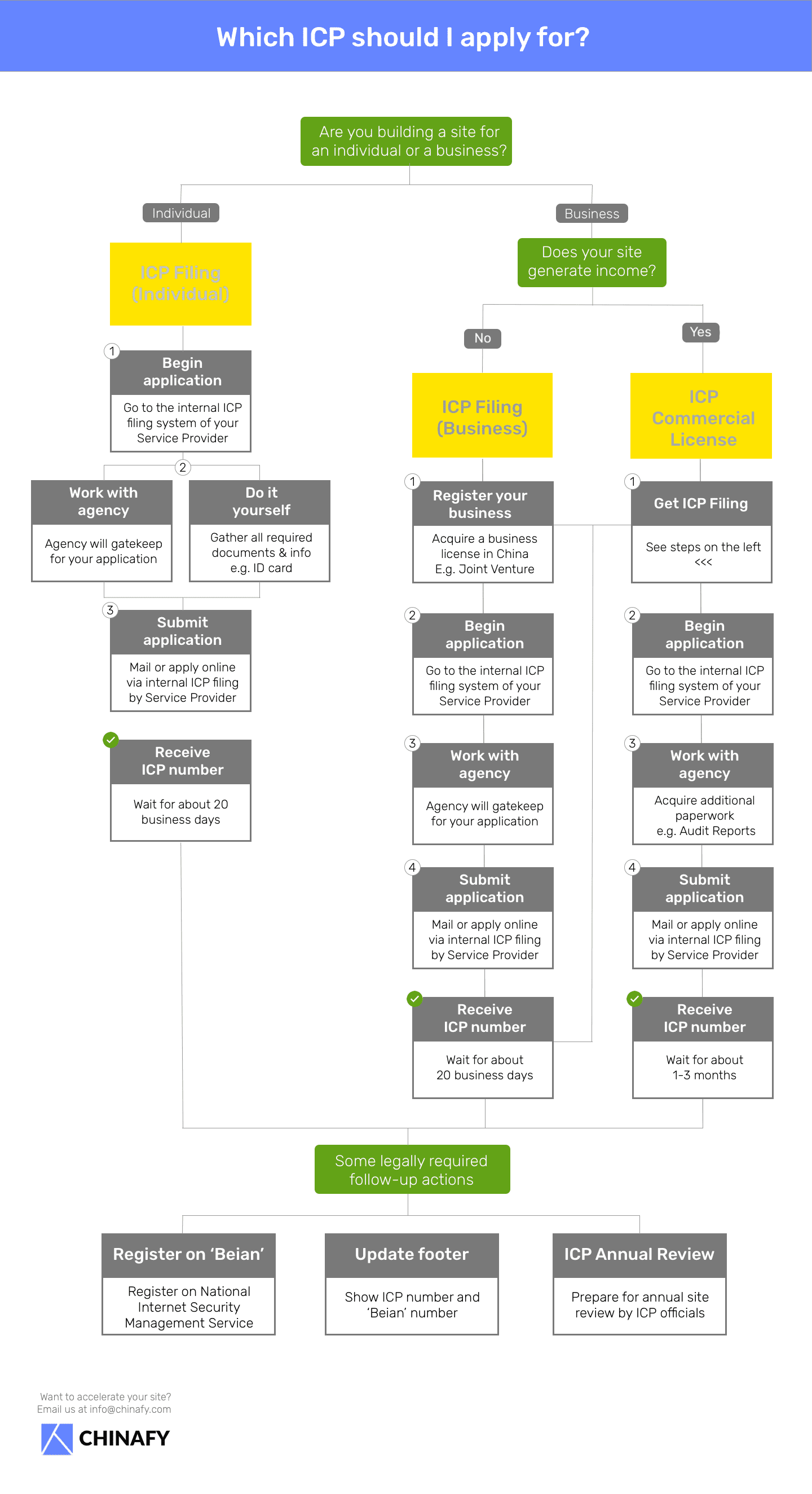
How to increase your chance of getting an ICP?
Rejection is not uncommon among first-time applicants, especially for commercial sites. To increase your chance of getting ICP, there are a few things you could try:
ICP Filing (Business)/ ICP Commercial License
Apply for an ICP in Beijing for generally faster processing. Unlike Shanghai where your domain needs to be more than 6-month valid, Beijing requires for yours only to be 3-month old. For further information, Alibaba Cloud outlines ICP regulation in different regions here.
If you haven’t had a business license in China yet, register your business license in the city where you have strong local support. That is because your business license’s location determines i) where ICP is filed, and ii) your basket of Service Providers. If you’d like to have English support, you might like to locate your business in where Alibaba Cloud and Tencent Cloud are available. Note that some Service Providers also request in-person appointments.
Limit the amount of user-generated content (UGC). It is generally believed that the more UGC your site contains, the more thorough your ICP review process will take.
Be cautious of agencies who claim to provide ‘fast-tracked’ ICP applications. Instead of filing an ICP application for you, they might offer an umbrella ICP number to you. If found, you will face penalties in China.
Common Barriers to Getting an ICP
With that said, ICP is still a months-long project that requires the luxury of time and resources, some common barriers international companies face include:
No Chinese entity nor Chinese nationals within the company
Long processing time (typically it takes 80+ days to get commercial sites approved)
Application and documentation are all in Chinese
Expensive Chinese proxy/agencies
Although in theory, MIIT does not charge anything for processing your application, the cost still remains arguably one of the largest barriers to most companies. For reference, Alibaba Cloud charges a minimum of RMB¥500,000 to consult on ICP Commercial License.
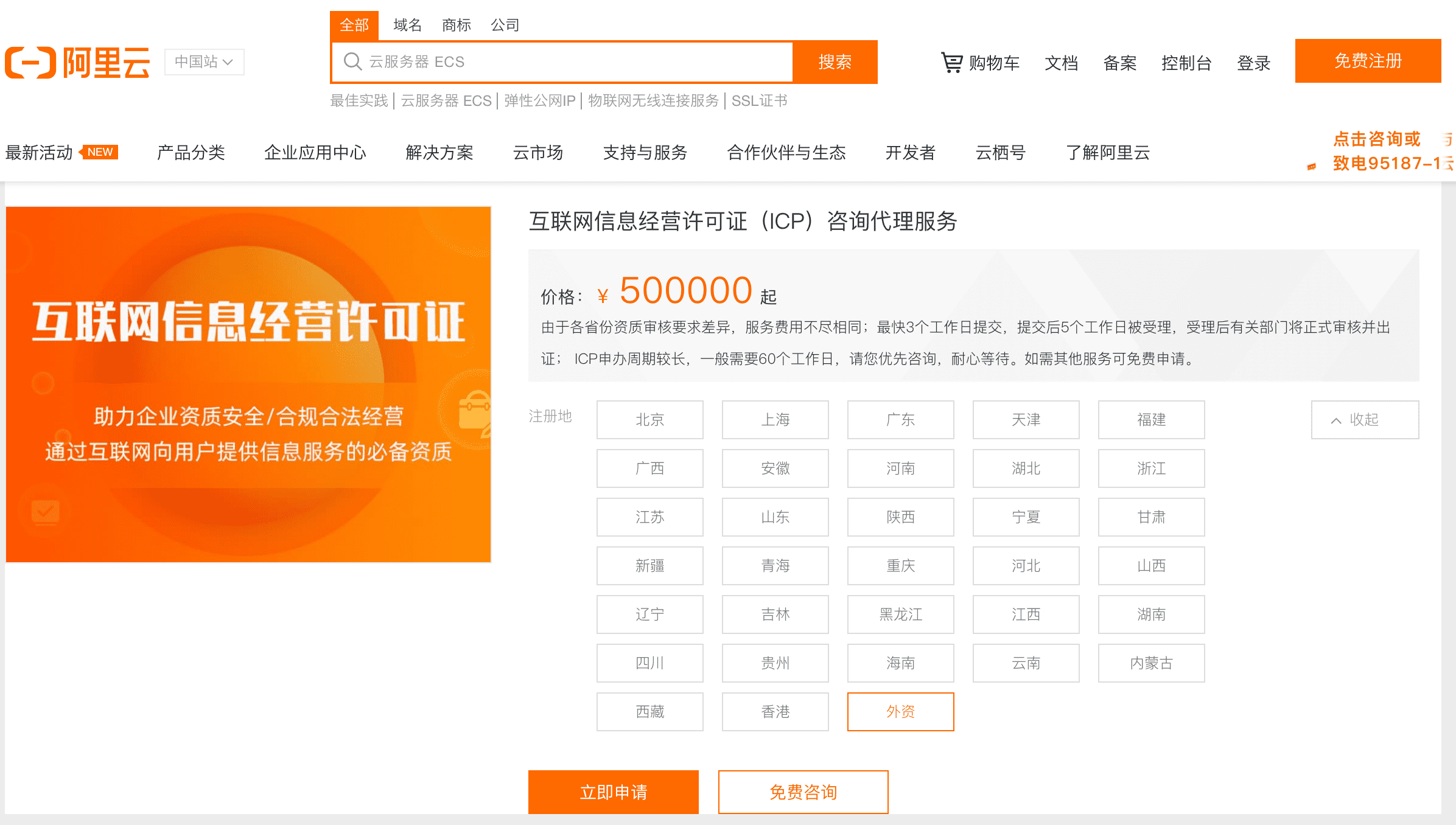
Alibaba Cloud charges RMB¥500,000 for ICP consulting with overseas companies.
We’ve done some calculations for your reference:
ICP for an informational site costs US$20,147
ICP for an e-commerce site costs US$104,204
Read the ICP costs breakdwon on 'How much does an ICP cost?'.
Final Thoughts: Do you really need an ICP? Any alternatives to optimise your site for China?
The decision really comes down to i) the nature of your website and ii) your objective of acquiring an ICP.
On (i), enquire more with Chinafy's ICP support.
On (ii), it's important to note that having an ICP doesn't resolve all performance issues. ICP-registered sites can still be 'broken' in China due to a mix of infrastructural and code-based incompatibility, resulting in a loading time up to 30-50 seconds.
So, if your goal was to get a faster site that works in China, ICP is not the final answer.
Read more about why websites don't work in China and ways to fix them.
Got questions? Click here to get in touch with Chinafy



1 - Expected post-Chinafy results






























